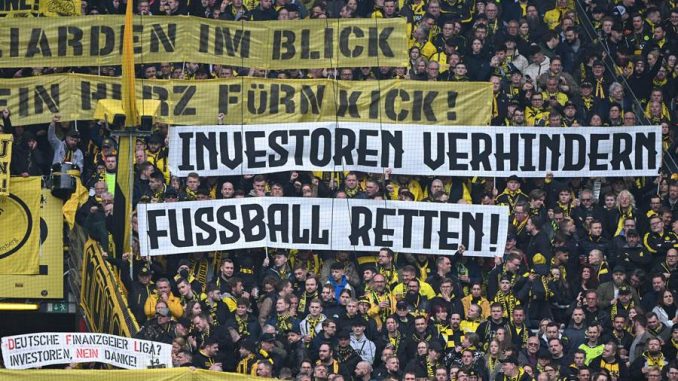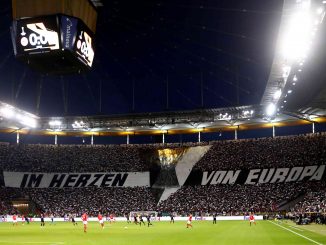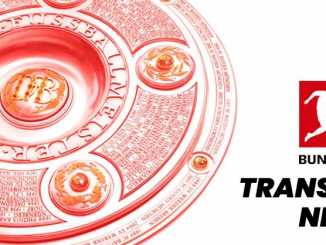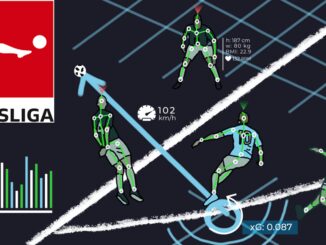
The banners were out in force again this weekend with fans across the Bundesliga voicing their objection to the Deutsche Fußball Liga’s (DFL) plans to invite outside investment by selling off shares in its broadcasting revenues to an investor.
The various fan groups are objecting to the plans claiming it will lead to an over-commercialisation of the game and be the start of a slippery slope to unwanted changes to the German football scene. Those proposing the deal are adamant that it will bring major benefits and help the Bundesliga close the massive gap in financial power that has seen the money in the Premier League absolutely gulf what German clubs have access to.
The powerful German fan culture has stood against and won numerous battles in the past including Monday night fixtures, the 50+1 ruling and fair ticket prices and they look to be very much up for this fight.
The proposal
So just what are the DFL proposing here? Well, the DFL plans to create a sister company which will manage and sell the league’s domestic and international broadcasting rights. The DFL claim that the initiative will immediately raise between €1.8 billion and €3 billion and there will be a sharing of future revenues.
This injection of funds will be invested in club infrastructure such as improving stadia and modernising youth systems. Another wedge of money would be distributed to the 36 clubs in the Bundesliga and 2.Bundesliga.
The argument for
Put quite simply German football needs to find a way of being more financially competitive or face the prospect of being left behind by the other leading European football leagues in England, Spain, Italy and France. The sacred 50+1 ruling in Germany makes it impossible for outside investors to come in and simply pump money into a club. What has happened at Chelsea and Newcastle recently could not happen in Germany, but the fact that it is allowed elsewhere puts future Bundesliga competitiveness in danger.
This season alone has seen Chelsea spend €611.5 million in transfer fees- which gulfs the entire spend of the 18 current Bundesliga clubs combined (€555 million). The Premier League’s international TV rights deal has netted them €6.3 billion between 2022 and 2025. In comparison the DFL’s current deal brings in around €170 million per year.
Borussia Dortmund CEO Hans-Joachim Watzke is the DFL’s new supervisory board chairman and he’s used BVB’s recent sale of Erling Haaland to strengthen his argument for investment.
“Anyone who calls for buying and keeping stars like Haaland must also know that this would probably also entail a significant increase – among other things – in ticket prices” he explained in a recent interview.
“Everything would become much, much more expensive for the fans. It’s obviously not possible to keep or buy top international stars and at the same time have the standing-room ticket cost only €8.”
Union Berlin president Dirk Zingler has spoken out in favour as has Rüdiger Fritsch, president of 2.Bundesliga leaders Darmstatdt. “We have to invest in our future now. We are confronted with changing media markets, changing user behaviour and rival leagues who are already investing long-term.
“The Premier League has already left us far behind and, if we don’t do something, Spain, Italy and France will steal a march too, since they don’t have a rule like 50+1 and so can make money in other ways.”
The argument against
The coordinated protests across the two top divisions amongst the fans has instantly shown there is very little support for the plans amongst the fan base. “Opening up to investors, particularly to private equity firms who are after maximum profit, risks them using their influence to maximize their returns, potentially against the interests of fans and stadium-goers,” explained Jan van Leeuwen, a board member of Borussia Dortmund’s official Fan Department.
The fear from fans is that investors are going to want to exert undue influence in return for their money, which will only have a detrimental effect on the fans. “In future, top fixtures could be played at 22:30 German time for the benefit of an American prime-time audience, as is already the case in Spain, or even abroad if it helps open up new revenue streams for the investor,” said Claas Schneider, spokesperson for Südtribüne Dortmund.
“It is also unclear how exactly the engagement of an investor is supposed to increase the competitiveness of the league. If the distribution of the extra revenue is weighted in favour of the clubs who are already strongest, in order to help them compete in European competition, it would only serve to cement the existing unequal structures and make it even harder for smaller clubs to ever bridge the gap.”
Despite assurances from Watzke that “any investor would have zero influence on sporting decisions such as kick-off times or anything like that”, the fans remain sceptical and fearful of where this will lead.
Game on!
To move their initiative forward the DFL are going to need a two-thirds majority of the 36 Bundesliga and 2.Bundesliga clubs to agree. Six potential investors are in talks with the DFL and a timeline of late April/ early May has been pencilled in for an extraordinary DFL general meeting. Whether the majority necessary can be achieved remains in question.
The fans are not going to just lie down and quietly allow this to happen, but whether this is a fight they can win remains to be seen.



